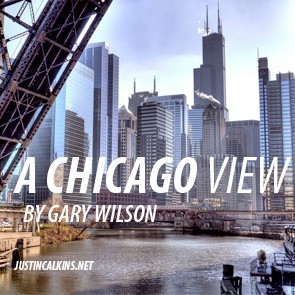
Gary Wilson
Chicago prides itself on trying to be big and bold.
“Make no little plans” is the best evidence of the big and bold mantra. It’s the phrase attributed to Daniel Burnham, the architect who created the master plan for Chicago’s development.
Mayor Rahm Emanuel has said he wants Chicago to be “the greenest city in the world” but that’s a fast track and only San Francisco and Portland tend to make international lists.
Chicago has a long way to go before it’s even in the green game.
Here’s what I mean.
Plastic bags and pet coke
Recently, two significant environmental topics were on the Chicago city council’s agenda and they weren’t conceptual or ethereal. They dealt with issues that impact Chicagoans daily.
 The first was a ban on plastic bags.
The first was a ban on plastic bags.
They are the kind of bags you get at the grocery store that are recyclable but more often than not end up in a landfill. Plastic bags are a legacy convenience — remember the “plastics” line from the classic 1969 movie The Graduate — and they’re everywhere.
Chicago has been playing catch up to progressive cities like San Francisco on the ban the plastic bag issue. City officials have considered proposals for seven years. But they always cave to the grocery store and bag lobby.
What to do about the towering mounds of pet coke on Chicago’s southeast side was the other green issue on the agenda.
The tar sands oil byproduct has been blowing its particulate matter into the houses and lungs of residents whose homes border the pet coke storage sites.
Community outrage swelled to the point that politicians had to do something.
The council recently acted on both issues with the approval of Emanuel. For the uninitiated about Chicago governance, in the past 25 years not much of substance is approved without the blessing of the mayor.
What council approved wasn’t a ban on plastic bags or pet coke storage.
The new bag ordinance is really about plastic bag reduction. Big box stores will have until August of 2015 to eliminate plastic bags and smaller ones until 2016. But small businesses and restaurants are exempt.
There was no ban on pet coke storage in the city either in spite of the demand for one by a well-organized citizen effort from the area that borders the storage facilities.
Instead, Chicago opted to allow no new storage of pet coke in the city and gave current sites two years to enclose the nasty stuff. That’s a long ways from Emanuel’s tough rhetoric where he said he’d make it so prohibitive to store pet coke in Chicago that the facilities would have to leave town.
History of mediocrity
If you’re surprised at Chicago’s softball approach to what should have been easy environmental targets you shouldn’t be. It has a history of environmental mediocrity.
Chicago’s biggest failure has been its attempts to effectively recycle.
Over a 13 year period the city tried to implement a designated Blue Bag recycling program that had as many starts and stops as a train on its L system. It never worked and was replaced with a Blue Bin program with a phased in roll out that had some residents without the bins putting their recycling into a neighbor’s bin.
We’re talking recycling here, not a cutting edge program.
And there’s the Chicago River.
The river has been referred to as an open sewer or a “plumbing fixture” because Chicago dumps its effluent into it without disinfecting it like almost every city. When asked why no disinfection, the water district’s stock answer was it would be too costly.
That will change in 2016 as outside pressure and a new and progressive slate of water commissioners decided to drop the costs too much crutch and spend the money to bring the system into the modern world.
Much of greater Chicago is outside the Great Lakes watershed yet it’s still allowed to divert 2 billion gallons of water daily from Lake Michigan based on a Supreme Court decree. With that kind of privilege you’d think it would be an exemplary steward of the region’s water.
But on the what to do about the Asian carp advancing through the Chicago River topic Chicago’s Mayor Emanuel has essentially been silent. Not what you’d expect from a high-profile mayor who used to proclaim that the Great Lakes are “our Grand Canyon.”
A few green signs won’t put city in the forefront
Chicago isn’t entirely tone deaf to environmental issues.
Emanuel used the gravitas of his office to get two antique coal-fired power plants closed that were polluting largely Hispanic neighborhoods. His predecessor, Richard M. Daley — the son — ignored the issue and the community’s wishes for years.
And Emanuel has moved quickly to make Chicago a bike-friendly city.
I could almost look the other way on Chicago’s soft approach to banning plastic bags, as egregious as they are. Even if it took seven years to do something it finally did something. In a few years a more enlightened generation of leaders will finish the job.
But the pet coke ordinance is indefensible.
Instead of a ban on pet coke storage that the citizens deserved they got a commitment to enclose the polluting piles in two years.
The crutch the city used for not banning the product was that a law would be vulnerable legally and defending it would cost a lot of money.
Tough-talking Chicago — the big shouldered city — backs down from a fight to protect its citizens from a nasty legacy pollutant. Whimper, whimper.
It’s unwilling to incur the expense of a legal fight to protect citizens. Instead it transfers the cost of the pollutant to them in the form of dirty pet coke dust in their parks, houses and lungs.
That won’t get you on a top 10 list of greenest cities.
